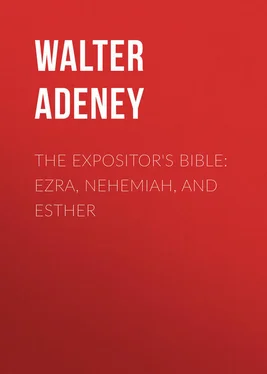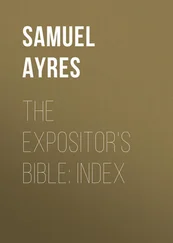Walter Adeney - The Expositor's Bible - Ezra, Nehemiah, and Esther
Здесь есть возможность читать онлайн «Walter Adeney - The Expositor's Bible - Ezra, Nehemiah, and Esther» — ознакомительный отрывок электронной книги совершенно бесплатно, а после прочтения отрывка купить полную версию. В некоторых случаях можно слушать аудио, скачать через торрент в формате fb2 и присутствует краткое содержание. Издательство: Иностранный паблик, Жанр: foreign_religion, foreign_antique, foreign_prose, на английском языке. Описание произведения, (предисловие) а так же отзывы посетителей доступны на портале библиотеки ЛибКат.
- Название:The Expositor's Bible: Ezra, Nehemiah, and Esther
- Автор:
- Издательство:Иностранный паблик
- Жанр:
- Год:неизвестен
- ISBN:нет данных
- Рейтинг книги:3 / 5. Голосов: 1
-
Избранное:Добавить в избранное
- Отзывы:
-
Ваша оценка:
- 60
- 1
- 2
- 3
- 4
- 5
The Expositor's Bible: Ezra, Nehemiah, and Esther: краткое содержание, описание и аннотация
Предлагаем к чтению аннотацию, описание, краткое содержание или предисловие (зависит от того, что написал сам автор книги «The Expositor's Bible: Ezra, Nehemiah, and Esther»). Если вы не нашли необходимую информацию о книге — напишите в комментариях, мы постараемся отыскать её.
The Expositor's Bible: Ezra, Nehemiah, and Esther — читать онлайн ознакомительный отрывок
Ниже представлен текст книги, разбитый по страницам. Система сохранения места последней прочитанной страницы, позволяет с удобством читать онлайн бесплатно книгу «The Expositor's Bible: Ezra, Nehemiah, and Esther», без необходимости каждый раз заново искать на чём Вы остановились. Поставьте закладку, и сможете в любой момент перейти на страницу, на которой закончили чтение.
Интервал:
Закладка:
It must be borne in mind that only a fraction of the Jews in the East went back to Palestine. Nor were they who tarried, in all cases, the more worldly, enamoured of the fleshpots. In the Talmud it is said that only the chaff returned, while the wheat remained behind. Both Ezra and Nehemiah sprang from families still residing in the East long after the return under Zerubbabel.
It is in accordance with these conditions that we come across one of the most curious characteristics of the Books of Ezra and Nehemiah – a characteristic which they share with Chronicles, viz., the frequent insertion of long lists of names.
Thus the second chapter of Ezra contains a list of the families who went up to Jerusalem in response to the edict of Cyrus. One or two general considerations arise here.
Since it was not a whole nation that migrated from the plains of Babylon across the great Syrian desert, but only some fragments of a nation, we shall not have to consider the fortunes and destinies of a composite unity, such as is represented by a kingdom. The people of God must now be regarded disjunctively. It is not the blessing of Israel, or the blessing of Judah, that faith now anticipates; but the blessing of those men, women, and children who fear God and walk in His ways, though, of course, for the present they are all confined to the limits of the Jewish race.
On the other hand, it is to be observed that this individualism was not absolute. The people were arranged according to their families, and the names that distinguished the families were not those of the present heads of houses, but the names of ancestors, possibly of captives taken down to Babylon by Nebuchadnezzar. As some of these names occur in later expeditions, it is plain that the whole of the families they represented were not found in the first body of pilgrims. Still the people were grouped in family order. The Jews anticipated the modern verdict of sociology, that the social unit is the family, not the individual. Judaism was, through and through, a domestic religion.
Further, it is to be noted that a sort of caste feeling was engendered in the midst of the domestic arrangement of the people. It emerges already in the second chapter of Ezra in the cases of families that could not trace their genealogy, and it bears bitter fruit in some pitiable scenes in the later history of the returned people. Not only national rights, but also religious privileges, come more and more to depend on purity of birth and descent. Religion is viewed as a question of blood relationship. Thus even with the very appearance of that new-born individualism which might be expected to counteract it, even when the recovered people is composed entirely of volunteers, a strong racial current sets in, which grows in volume until in the days of our Lord the fact of a man's being a Jew is thought a sufficient guarantee of his enjoying the favour of Heaven, until in our own day such a book as "Daniel Deronda" portrays the race-enthusiasm of the Israelite as the very heart and essence of his religion.
We have three copies of the list of the returning exiles – one in Ezra ii., the second in Nehemiah vii., and the third in 1 Esdras v. They are evidently all of them transcripts of the same original register; but though they agree in the main, they differ in details, giving some variation in the names and considerable diversity in the numbers – Esdras coming nearer to Ezra than to Nehemiah, as we might expect. The total, however, is the same in every case, viz., 42,360 (besides 7337 servants) – a large number, which shows how important the expedition was considered to be.
The name of Zerubbabel appears first. He was the lineal descendant of the royal house, the heir to the throne of David. This is a most significant fact. It shows that the exiles had retained some latent national organisation, and it gives a faint political character to the return, although, as we have already observed, the main object of it was religious. To fervent readers of old prophecies strange hopes would dawn, hopes of the Messiah whose advent Isaiah, in particular, had predicted. Was this new shoot from the stock of David indeed the Lord's Anointed? Those who secretly answered the question to themselves in the affirmative were doomed to much perplexity and not a little disappointment. Nevertheless Zerubbabel was a lower, a provisional, a temporary Messiah. God was educating His people through their illusions. As one by one the national heroes failed to satisfy the large hopes of the prophets, they were left behind, but the hopes still maintained their unearthly vitality. Hezekiah, Josiah, Zerubbabel, the Maccabees all passed, and in passing they all helped to prepare for One who alone could realise the dreams of seers and singers in all the best ages of Hebrew thought and life.
Still the bulk of the people do not seem to have been dominated by the Messianic conception. It is one characteristic of the return that the idea of the personal, God-sent, but human Messiah recedes; and another, older, and more persistent Jewish hope comes to the front – viz., the hope in God Himself as the Saviour of His people and their Vindicator. Cyrus could not have suspected any political designs, or he would not have made Zerubbabel the head of the expedition. Evidently "Sheshbazzar, the prince of Judah," to whom Cyrus handed over the sacred vessels of the temple, is the same man as Zerubbabel, because in v. 16 we read that Sheshbazzar laid the foundation of the temple, while in iii. 8 this work is ascribed to Zerubbabel, with whom the origin of the work is again connected in v. 2.
The second name is Jeshua. 15 15 This name is a later form of "Joshua"; the older form of the name is used for the same person in Hag. i. 1, 14, and Zech. iii. 1.
The man who bears it was afterwards the high-priest at Jerusalem. It is impossible to say whether he had exercised any sacerdotal functions during the exile; but his prominent place shows that honour was now offered to his priesthood. Still he comes after the royal prince.
Then follow nine names without any description. 16 16 Of course the Nehemiah and Mordecai in this list are different persons from those who bear the same names in the Books of Nehemiah and Esther and belong to later dates.
Nehemiah's list includes another name, which seems to have dropped out of the list in Ezra. These, together with the two already mentioned, make an exact dozen. It cannot be an accident that twelve names stand at the head of the list; they must be meant to represent the twelve tribes – like the twelve apostles in the Gospels, and the twelve gates of the New Jerusalem in the Apocalypse. Thus it is indicated that the return is for all Israel, not exclusively for the Judæan Hebrews. Undoubtedly the bulk of the pilgrims were descendants of captives from the Southern Kingdom. 17 17 See Ezra i. 5.
The dispersion of the Northern Kingdom had begun two centuries earlier than Nebuchadnezzar's invasion of Judæa; it had been carried on by successive removals of the people in successive wars. Probably most of these early exiles had been driven farther north than those districts which were assigned to the Judæan captives; probably, too; they had been scattered far and wide; lastly, we know that they had been sunken in an idolatrous imitation of the manners and customs of their heathen neighbours, so that there was little to differentiate them from the people among whom they were domiciled. Under all these circumstances, is it remarkable that the ten tribes have disappeared from the observation of the world? They have vanished, but only as the Goths have vanished in Italy, as the Huguenot refugees have vanished in England – by mingling with the resident population. We have not to search for them in Tartary, or South America, or any other remote region of the four continents, because we have no reason to believe that they are now a separate people.
Интервал:
Закладка:
Похожие книги на «The Expositor's Bible: Ezra, Nehemiah, and Esther»
Представляем Вашему вниманию похожие книги на «The Expositor's Bible: Ezra, Nehemiah, and Esther» списком для выбора. Мы отобрали схожую по названию и смыслу литературу в надежде предоставить читателям больше вариантов отыскать новые, интересные, ещё непрочитанные произведения.
Обсуждение, отзывы о книге «The Expositor's Bible: Ezra, Nehemiah, and Esther» и просто собственные мнения читателей. Оставьте ваши комментарии, напишите, что Вы думаете о произведении, его смысле или главных героях. Укажите что конкретно понравилось, а что нет, и почему Вы так считаете.












